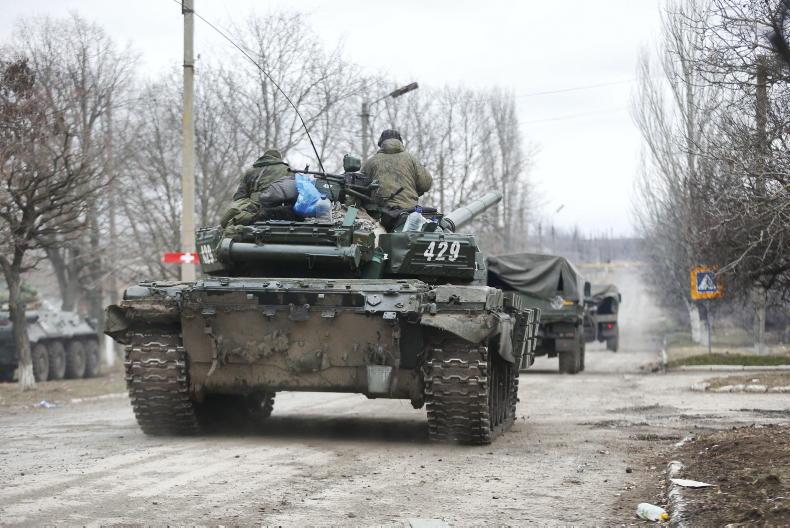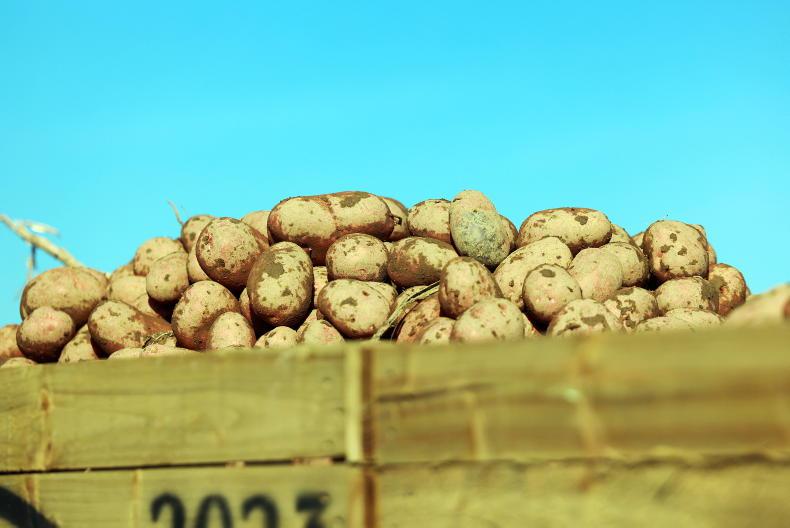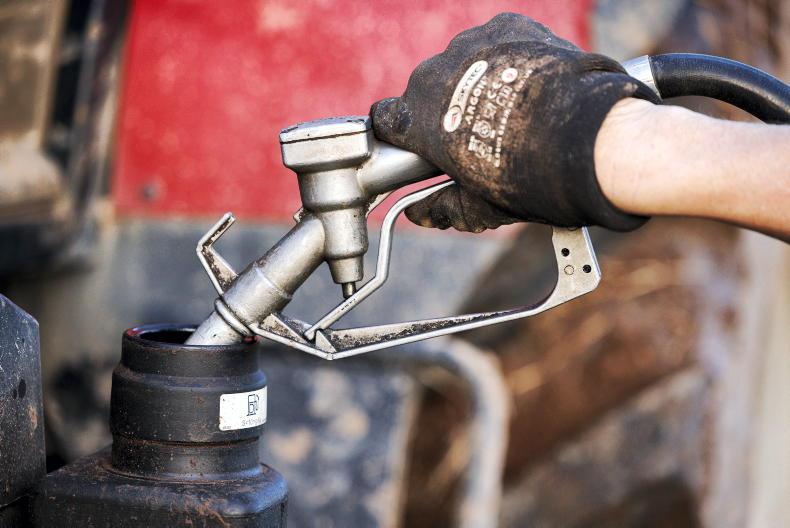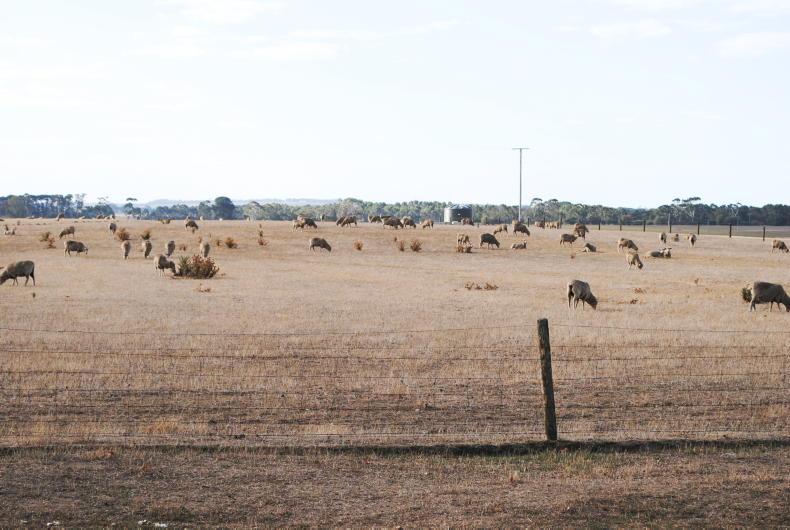Mykola Gordiychuk farms 100ha of winter wheat along with running a large potato enterprise on two farms in the Kyiv and Chernihiv Oblasts of northern Ukraine.
His farms were taken over by the Russians following the invasion in late February, with the land retaken by Ukrainian forces weeks later, allowing him to return just in time to get this year’s potatoes set.
The planting was delayed and some workers were called to the front line to fight, leaving the remaining staff to work 12-hour shifts every single day of April and May to get seed potatoes graded and out to neighbouring farms for planting.
Gordiychuk spoke to the Irish Farmers Journal while attending the World Potato Congress in the RDS as vice-president of the Ukrainian Potato Growers Association about the challenges of farming in a country under full-scale military attack.
Destroyed
“I was in Kyiv when the war stated and then I could not get to my farm for about a month because the bridges were destroyed and also the highway [motorway] was destroyed,” Gordiychuk told the Irish Farmers Journal.
“By the time I was able to get there it was about 4 April, which was already a little late for the season, because we grow 100ha of winter wheat, so we needed to put fertiliser.
“To plant potatoes, we had to prepare the soil, but before planting potatoes, we had to clean the fields from rockets and fragments of rockets,” he said.
Russian aggression
Gordiychuk commented that his farm was one of the “lucky” ones, in that most of his equipment had not been left at the farms for the Russians to steal.
Imported tractor models, such as the John Deeres and Massey Fergusons used on his farm, were particularly prone to theft by the invaders, he said.
Other machinery on farms in the area not stolen by the Russians had been damaged in the fighting and was left unusable, further impeding locals’ efforts to farm at wartime.
“We were lucky in our area that Russians did not take any machinery. They only stole some diesel, some tools, welding machines, etc.
"A lot of machinery is destroyed by shelling and rockets,” the tillage farmer added.
“Imported machinery like John Deeres and Claas harvesters were just loaded and taken away to Russia. It’s easy to find them now with GPS.
“Our tractor drivers took the machines from our farm to their yards. When Russians came to the farm, they saw a store filled with potatoes and no machinery,” he said.
Late planting
The potato farmer stated that the delays in fertilising the wheat crops were likely to impact negatively in this year’s yield.
Similarly, the setbacks posed by the bomb fragments pushed back potato planting beyond the usual date.
“We started planting, I think, on 1 May, instead of [when we usually do] on 1 April,” he went on.
“Logistics was completely destroyed. We had difficulty getting fertiliser, we had problems [sourcing] crop protection chemicals. The supply chains were broken.
“Diesel is a big problem for farmers now. Diesel for planting, but also for spraying,” said the Ukrainian farmer.
Stuck supplies
Gordiychuk stated that he was the exception to most Ukrainian farmers, having only 50t of wheat in storage, as most wait until the summer months to sell significant proportions of their harvest from the previous year.
Not being able to sell last year’s crop from sheds has left many farmers in a difficult cashflow situation, if they are in areas where inputs can be found.
“But the biggest problem farmers today have is being able to sell their crops from last year, because most farmers, they store wheat, maize and sunflower [seed] until spring and try to sell, but, now, logistics are all broken and the Black Sea ports are all blocked,” said the farmer.
“We have over 25m tonnes of cereals in the country of which we cannot get rid [of].
“When you don’t sell your produce, you don’t have working capital so you cannot continue the season,” explained Gordiychuk.
Read more
Russia turning wheat into a weapon of war
War threatens to tip tens of millions into food insecurity - UN
Editorial: has the EU woken up to farmers as food producers?
Mykola Gordiychuk farms 100ha of winter wheat along with running a large potato enterprise on two farms in the Kyiv and Chernihiv Oblasts of northern Ukraine.
His farms were taken over by the Russians following the invasion in late February, with the land retaken by Ukrainian forces weeks later, allowing him to return just in time to get this year’s potatoes set.
The planting was delayed and some workers were called to the front line to fight, leaving the remaining staff to work 12-hour shifts every single day of April and May to get seed potatoes graded and out to neighbouring farms for planting.
Gordiychuk spoke to the Irish Farmers Journal while attending the World Potato Congress in the RDS as vice-president of the Ukrainian Potato Growers Association about the challenges of farming in a country under full-scale military attack.
Destroyed
“I was in Kyiv when the war stated and then I could not get to my farm for about a month because the bridges were destroyed and also the highway [motorway] was destroyed,” Gordiychuk told the Irish Farmers Journal.
“By the time I was able to get there it was about 4 April, which was already a little late for the season, because we grow 100ha of winter wheat, so we needed to put fertiliser.
“To plant potatoes, we had to prepare the soil, but before planting potatoes, we had to clean the fields from rockets and fragments of rockets,” he said.
Russian aggression
Gordiychuk commented that his farm was one of the “lucky” ones, in that most of his equipment had not been left at the farms for the Russians to steal.
Imported tractor models, such as the John Deeres and Massey Fergusons used on his farm, were particularly prone to theft by the invaders, he said.
Other machinery on farms in the area not stolen by the Russians had been damaged in the fighting and was left unusable, further impeding locals’ efforts to farm at wartime.
“We were lucky in our area that Russians did not take any machinery. They only stole some diesel, some tools, welding machines, etc.
"A lot of machinery is destroyed by shelling and rockets,” the tillage farmer added.
“Imported machinery like John Deeres and Claas harvesters were just loaded and taken away to Russia. It’s easy to find them now with GPS.
“Our tractor drivers took the machines from our farm to their yards. When Russians came to the farm, they saw a store filled with potatoes and no machinery,” he said.
Late planting
The potato farmer stated that the delays in fertilising the wheat crops were likely to impact negatively in this year’s yield.
Similarly, the setbacks posed by the bomb fragments pushed back potato planting beyond the usual date.
“We started planting, I think, on 1 May, instead of [when we usually do] on 1 April,” he went on.
“Logistics was completely destroyed. We had difficulty getting fertiliser, we had problems [sourcing] crop protection chemicals. The supply chains were broken.
“Diesel is a big problem for farmers now. Diesel for planting, but also for spraying,” said the Ukrainian farmer.
Stuck supplies
Gordiychuk stated that he was the exception to most Ukrainian farmers, having only 50t of wheat in storage, as most wait until the summer months to sell significant proportions of their harvest from the previous year.
Not being able to sell last year’s crop from sheds has left many farmers in a difficult cashflow situation, if they are in areas where inputs can be found.
“But the biggest problem farmers today have is being able to sell their crops from last year, because most farmers, they store wheat, maize and sunflower [seed] until spring and try to sell, but, now, logistics are all broken and the Black Sea ports are all blocked,” said the farmer.
“We have over 25m tonnes of cereals in the country of which we cannot get rid [of].
“When you don’t sell your produce, you don’t have working capital so you cannot continue the season,” explained Gordiychuk.
Read more
Russia turning wheat into a weapon of war
War threatens to tip tens of millions into food insecurity - UN
Editorial: has the EU woken up to farmers as food producers?








SHARING OPTIONS